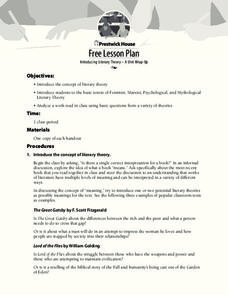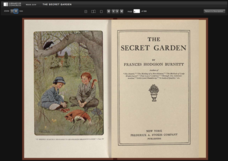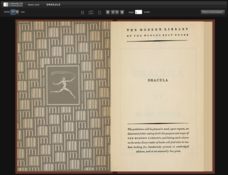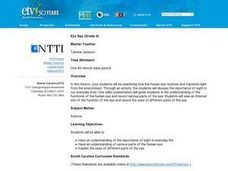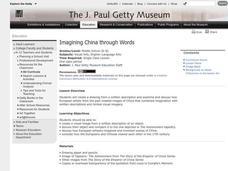DLTK
Writing Limericks
Scholars are lucky to stretch their poetry writing muscles with a worksheet that challenges them to compose two limericks—one about a boy and the other about a dog.
K5 Learning
The Fishhawk
Read about why the osprey is also known as the fishhawk in a short reading passage that describes where they live, what they eat, and what they look like. After reading, individuals respond to four short answer questions based on what...
K5 Learning
Helping Hally
Dogs have to stay healthy, too! Take a look at a reading comprehension activity that includes a passage about Sam and his dog Hally, who could use a few more walks and exercise.
K5 Learning
One of Aesop's Fables
It's one thing to have an idea, but someone has to put it into action! Young pupils read a rendition of Aesop's fable of the mice in the council before answering four questions about details from the text.
Prestwick House
Introducing Literary Theory – A Unit Wrap-Up
Literary theories are lenses through which a text may be analyzed. The question in this lesson plan is how a particular literary lens can influence the reader's view of the text.
Nosapo
Shopping for Clothing
Let's go shopping! A series of activities focus on vocabulary words related to articles of clothing and shopping for clothes. Additionally, learners complete sentences using how much and how many.
Library of Congress
A Christmas Carol
Have you ever wanted to read an early edition of Charles Dickens' A Christmas Carol? Experience the next best thing with an eBook version of the novel. From the haunting first words to the jolly send-off in the conclusion, the eBook...
Library of Congress
The Secret Garden
Mary Lennox was a disagreeable little girl; do your scholars relate? An eBook version of The Secret Garden introduces readers to Mary Lennox and tells the story of how she grows to think beyond herself. The digital text includes the...
University of North Carolina
Abstracts
Some of the best information to include when writing a research paper doesn't come from books, magazine articles, or informational websites—it comes from dissertations. However, reading an entire dissertation is often a daunting task....
Library of Congress
Dracula
Readers experience classic thrills and chills in the digital version of Mary Shelley's Dracula. The online version of the classic text has the look and feel of an old book with modern upgrades, such as buttons to navigate between pages...
Meadows Center for Preventing Educational Risk, University of Texas at Austin
Lesson 2 - Consonant-Vowel-Consonant Words
Closed syllable words contain short vowel sounds. A phonics lessons introduces readers to consonant-vowel-consonant words. Guided instruction introduces the words with a series of dictation activities, and then learners practice reading...
K12 Reader
Replace with Proper Nouns
Three paragraphs make up a practice page all about proper nouns. Young grammarians choose from 12 words to fill in the blanks and complete sentences with the correct part of speech.
Pace University
Short Stories
A reading of Kevin Lamb's short story "Lost in the Woods" launches a study of how writers use elements such as foreshadowing, mood, character development, setting, and conflict to engage readers. Class members then demonstrate what they...
EngageNY
Analyzing Textual Evidence: Working Conditions in the Mills
Deafening, dusty, debris. Such were the working conditions in the 1800s textile industry as portrayed in Katherine Paterson's novel Lyddie. Scholars watch a short video clip about life and work in the mills. Next, they work with partners...
EngageNY
Researching Digital Sources, Part 1: Guided WebQuest
We are living in a technical world. Scholars learn how to examine digital resources for their research on DDT. They explore a list of websites using a Digital Resources on DDT sheet. Learners examine their research notebook to determine...
Curated OER
Eye Spy!
Students explore using descriptive words by playing a What Do You See? game, describing items in a Mystery Bag, and using Eye-Spy binoculars on an on-campus field trip. They read the book, I Went Walking, and write descriptions of a...
Curated OER
Imagining China Through Words
Middle schoolers create a drawing from a written description and examine and discuss how European artists from the past created images of China that combined imagination with written descriptions and limited visual imagery.
Curated OER
Monster Exchange
Students draw and describe their monster. They exchange papers with another student and recreate the monster based on the other student's description.
Curated OER
Imagining China Through Words
Students create a drawing from a written description to examine images of China in European art. In this art analysis lesson, students create a visual image from a written description of an object. Students compare their image to the one...
Curated OER
Writing to Photography/Photography to Writing
Students improve their' writing by incorporating photography into descriptive and narrative writing exercises. They write descriptions of various professional photographic collections. Later they use their own and other classmates'.
Curated OER
Adjective Monster
Explore descriptive writing and visual art. Listen to the story Go Away Big, Green Monster by Ed Emberley and generate a list of adjectives used in the book. Name familiar shapes and create a shapes list. Choose an adjective and shape to...
Curated OER
Headless Horseman, Heady Author
Twelfth graders explore figurative language as it appears in Washington Irving's original text, The Legend of Sleepy Hollow, answer questions based on story, and write sequels to it by using the different types of figurative language...
Curated OER
Looking at Life through the Creation of Personal Metaphors
Students focus on the creation of personal metaphors, which are first illustrated in pictures and caricatures and then extended to descriptive/analytical paragraphs. They teach the lesson to others using their own personal metaphors as...
Curated OER
Comprehension-Characters/characterization
Fifth graders discuss characterization as well as to define antagonist and protagonist. In this language arts lesson, 5th graders write questions for an interview of a character in the book "The Three Little Pigs" and then answer them....
Other popular searches
- Vivid Descriptive Language
- Using Descriptive Language
- Turkey Descriptive Language
- Fruit Descriptive Language
- Descriptive Language Use
- Descriptive Language Reading
- Descriptive Language Opener






